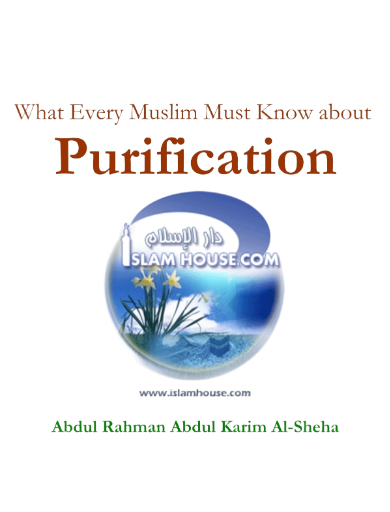Hub For Your Daily Islamic Insights 🕋 🕌

What Every Muslim Must Know about Purification, Comprehensive guide on purification in Islam
Comprehensive guide on purification in Islam
Free
Unlock the essentials of Islamic purification with 'What Every Muslim Must Know about Purification' by Abdul Rahman Abdul Karim Al-Sheha. This comprehensive guide offers clear and practical insights into the principles and rituals of cleanliness and purity in Islam, making it an indispensable resource for both new learners and practicing Muslims. Written in easy-to-understand language, this book covers everything from daily ablutions to the deeper spiritual significance of purity. With its compact size and lightweight paperback format, it's perfect for personal study or as a thoughtful gift. Experience a deeper connection to your faith with this valuable addition to any Islamic library.
### Comprehensive Guide on Purification in Islam Purification, or Taharah, plays a vital role in the Islamic faith. It is a fundamental aspect that encompasses both physical and spiritual cleanliness, preparing Muslims for acts of worship and daily life. This guide aims to elaborate on what every Muslim must know about purification, its significance, types, and the practical steps involved. #### 1. Importance of Purification (Taharah) In Islam, purity is not just a physical state but also a spiritual one. The Quran mentions purification numerous times, emphasizing its importance in worship: - **Surah Al-Baqarah (2:222)**: "Indeed, Allah loves those who are purifiers." Purification symbolizes the removal of sins and impurities, enabling the believer to approach Allah with a clean heart and mind. It is also essential for performing specific acts of worship, such as Salah (prayer) and handling the Quran. #### 2. Types of Purification There are two primary forms of purification in Islam: ##### a. Minor Purification (Wudu) Wudu is the process of washing specific parts of the body to achieve a state of ritual purity before performing prayers or handling the Quran. **Steps for Performing Wudu:** 1. **Intention (Niyyah)**: Mentally intend to perform Wudu. 2. **Bismillah**: Say "Bismillah" (In the name of Allah) before starting. 3. **Hands**: Wash both hands up to the wrists three times. 4. **Mouth**: Rinse the mouth three times. It is recommended to use the right hand. 5. **Nose**: Sniff water into the nose and blow it out three times. 6. **Face**: Wash the entire face three times, making sure to wash the area from the hairline to the chin and from ear to ear. 7. **Arms**: Wash both arms, including the elbows, three times, starting with the right arm. 8. **Head**: Wipe a portion of the head once, using both hands to wipe from the front to the back. 9. **Ears**: Wipe the inside and outside of the ears with wet fingers. 10. **Feet**: Wash both feet up to the ankles three times, starting with the right foot. ##### b. Major Purification (Ghusl) Ghusl is required for situations of greater impurity, such as after sexual intercourse or menstruation. Performing Ghusl restores an individual’s state of purity and enables them to engage in worship. **Steps for Performing Ghusl:** 1. **Intention (Niyyah)**: Internally intend to purify oneself. 2. **Bismillah**: Say "Bismillah" before starting the Ghusl. 3. **Complete Wash**: Start by washing your hands thoroughly. 4. **Wash Private Parts**: Clean the private parts to remove any impurities. 5. **Wudu**: Perform Wudu as described above, but you may skip washing the feet for now. 6. **Full Body Wash**: Pour water over your entire body, ensuring that every hair and skin area is thoroughly washed. It is better if water reaches the roots of your hair. 7. **Feet**: Finally, wash both feet. #### 3. Conditions and Validity of Purification Understanding the conditions and validity of purification is important: - **Impurities (Najasah)**: Any substance deemed impure must be removed. Common impurities include urine, feces, blood, and alcohol. - **Breaking Wudu**: Wudu is nullified by actions such as relieving oneself, passing gas, sleeping, or losing consciousness. - **Circumstances Requiring Ghusl**: Ghusl is obligatory after: - Sexual intercourse - Menstruation - Childbirth (postnatal bleeding) - **When Its Invalid**: Activities like eating the meat of a non-slaughtered animal, or any situation that necessitates a new Wudu, may invalidate the previous state of cleanliness. #### 4. Purification of Clothing and Place Purification extends beyond the body. It is essential to maintain cleanliness in one’s clothing and the place of worship: - **Washing Clothes**: Any clothing that has become impure should be washed until the impurity is removed. - **Clean Spaces**: The area where prayers are performed should also be clean and free from any impurities. #### 5. The Importance of Purification in Daily Life Purification is not limited to specific rituals; it also enhances personal hygiene and health in daily life. - **Physical Health**: Regular washing, maintaining cleanliness, and using fresh water can prevent the spread of germs and promote personal hygiene. - **Mental Clarity**: Engaging in purification practices can lead to increased mindfulness and connection with spiritual practices, promoting peace of mind. - **Cultivating Discipline**: Regularly observing purification practices instills discipline and a sense of responsibility in a Muslim's daily routine. #### 6. Conclusion Purification in Islam is a comprehensive practice that enriches both religious observance and daily living. Understanding the types and methods of purification, along with their spiritual significance, forms a cornerstone of a Muslim's faith. It is an ongoing commitment to maintaining purity in body and spirit, ultimately strengthening one's relationship with Allah. By applying the principles of Taharah, Muslims not only fulfill religious obligations but also foster a sense of cleanliness and spirituality in their lives.
